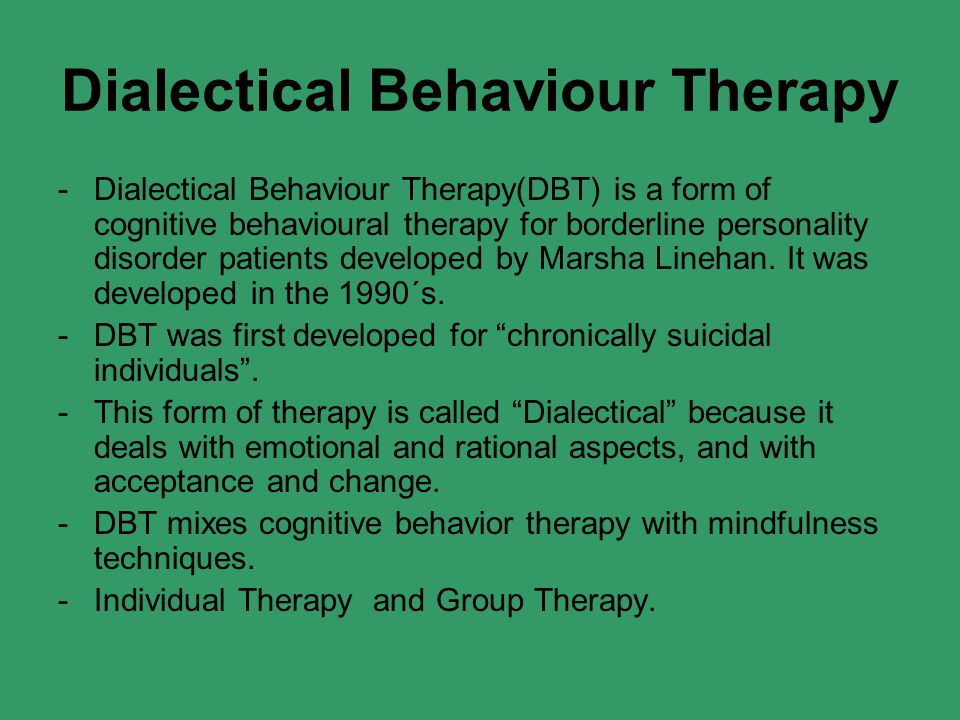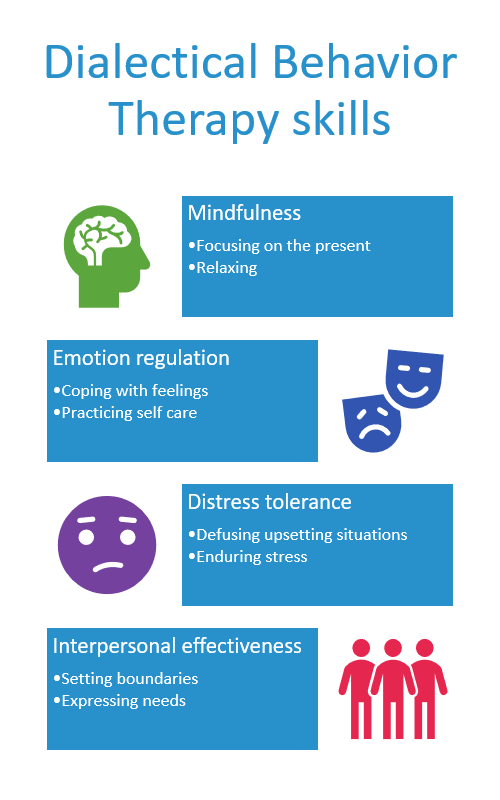Harnessing the Power of Dialectical Behaviour Therapy (DBT) Providers for Lasting Psychological Balance and Improved Relationships
In a globe where psychological well-being and preserving healthy connections are critical parts of a satisfying life, the utilization of Dialectical Practices Treatment (DBT) services has actually arised as a beacon of hope for several individuals. The organized and evidence-based method of DBT uses a path towards sustainable psychological balance and enhanced communications with others.

Comprehending the Core Principles of DBT
Dialectical Behavior Modification (DBT) is founded upon a set of core principles that underpin its restorative approach to advertising emotional equilibrium and mental well-being. Among the fundamental concepts of DBT is dialectics, which emphasizes the synthesis of apparently opposite ideas to arrive at a more well balanced perspective. This includes recognizing and accepting the contradictions and tensions within oneself, leading to a higher feeling of harmony and understanding. Mindfulness is one more core concept of DBT, focusing on being fully present in the moment without judgment. By cultivating mindfulness, individuals can create an enhanced understanding of their habits, ideas, and feelings, enabling for better self-regulation and emotional control.

Recognition is likewise integral to DBT, stressing the relevance of approving and acknowledging one's experiences and feelings as valid. By incorporating these core principles into treatment, DBT provides a detailed and reliable approach to promoting emotional health and emotional resilience.
Creating Emotional Regulation Skills
Psychological regulation skills are vital elements of Dialectical Behavior modification (DBT) that allow individuals to efficiently manage their emotions and browse challenging situations with strength. These abilities include the capability to determine and understand one's feelings, endure distress, manage extreme sensations, and act in conformity with personal worths even when faced with emotional chaos. Creating emotional policy skills entails learning mindfulness techniques to remain existing in the moment, recognizing the triggers that result in psychological dysregulation, and applying coping strategies to modulate psychological reactions.

Enhancing Interpersonal Efficiency
Improving communication skills and promoting meaningful connections with others are important elements of establishing interpersonal performance within the framework of Dialectical Actions Therapy (DBT) In DBT, boosting social performance entails finding out exactly how to assertively express one's needs and boundaries while also taking into consideration the requirements and borders of others. This skill is important for constructing healthy and balanced partnerships and minimizing conflict. DBT shows individuals exactly how to interact efficiently, navigate social difficulties, and create strategies for settling conflicts in a constructive fashion.
One trick element of enhancing social effectiveness in DBT is learning to identify and handle emotions in social communications. DBT London. By enhancing psychological awareness, people can reply to others in a much more understanding and understanding way. Additionally, DBT emphasizes the value of exercising mindfulness in social partnerships, encouraging individuals to be present in their interactions and totally involve with others
Practicing Mindfulness Techniques
Creating a consistent mindfulness practice is vital for individuals undertaking Dialectical Habits Treatment (DBT) to cultivate psychological policy and boost their interpersonal performance. Mindfulness strategies, a core element of DBT, involve taking notice of the here and now moment without judgment. With mindfulness, people can become much more conscious of their thoughts, feelings, and physical sensations, enabling them to react to scenarios with better clearness and control.
One secret mindfulness strategy used in DBT is mindfulness reflection. This practice includes concentrating on the breath or a specific item while acknowledging and letting go of any kind of distracting thoughts. By including mindfulness meditation right into their day-to-day routine, individuals can educate their minds to stay existing and lower sensitivity to stressors.
One more crucial aspect of practicing mindfulness in DBT is navigate to these guys the concept of radical acceptance. Radical approval includes completely welcoming truth as it is, also when it is uncomfortable or difficult. By approving the present moment without judgment, individuals can lower their suffering and include favorable adjustment.
Applying DBT Methods in Day-to-day Live
Building upon the foundation of mindfulness methods such as reflection and radical approval, people can integrate DBT strategies right into their every day lives to cultivate emotional balance and enhance their social abilities. One efficient DBT technique is using dialectics, which motivates people to locate the center ground between 2 opposing thoughts or feelings. By practicing dialectics in everyday interactions, individuals can learn to validate their very own sensations while additionally taking into consideration the perspectives of others. Another essential DBT ability for everyday life is distress tolerance, which entails discovering exactly how to cope with intense emotions without considering hazardous actions. This can be accomplished with methods such as self-soothing tasks, diversion strategies, or enhancing the moment. Additionally, interpersonal efficiency abilities instructed in DBT can aid individuals communicate their requirements assertively, established boundaries, and preserve healthy partnerships. By regularly using these DBT strategies news in life, individuals can experience lasting psychological equilibrium and improve their total well-being.
Conclusion

Emotional guideline abilities are vital elements of Dialectical Habits Therapy (DBT) that make it possible for people to properly handle their emotions and navigate tough scenarios with strength.Through DBT solutions, people can cultivate a deeper understanding of their emotions, recognize patterns of behavior that add to psychological distress, and get practical tools to control their feelings constructively.Establishing a constant mindfulness method is vital for individuals undergoing Dialectical Actions Therapy (DBT) to cultivate emotional regulation and improve their interpersonal performance.Structure upon the foundation of mindfulness methods such see as reflection and extreme approval, individuals can integrate DBT techniques right into their everyday lives to cultivate emotional equilibrium and improve their social abilities. By recognizing the core principles of DBT, creating psychological law abilities, boosting social effectiveness, exercising mindfulness techniques, and using DBT methods in daily life, people can experience considerable improvements in their overall wellness and connections.
Comments on “Accept Modification with DBT London: Your Guide to Mental Health”